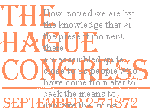
The International Workingmen's Association, 1872
Published: as a lithographed leaflet: Modifications aux Statuts Généraux proposées par la section Ferré. — Modifications aux Réglements administratifs, Paris, 1872;
Translated: by Richard Dixon & Alex Miller, for Progress Publishers, 1976.
Transcribed: by director@marx.org.
The General Council shall form an international agency between the different national and local groups of the Association, so that the working men in one country be constantly informed of the movements of their class in every other country; that an inquiry, etc., etc.
Whenever it seems opportune, the General Council shall take the initiative of proposals to be laid before the different national or local societies.
To facilitate, etc..., etc....
The General Council shall form an international agency between the different national groups of the Association, so that the working men in one country be constantly informed of the movements of their class in every other country; that an inquiry, etc., etc..
Whenever it seems opportune, the General Council shall take the initiative of proposals to be laid before the national societies.
To facilitate, etc..., etc....
Since the success of the working men's movement the members of the International Association shall use their utmost efforts to combine the disconnected working men's societies of their respective countries into national bodies, represented by central national organs.
It is self-understood, however, that the appliance of this rule will depend upon the peculiar laws of each country, and that, apart from legal obstacles, no independent local society shall be precluded from directly corresponding with the General Council.
Since the success of the working men's movement etc.... consequently, considering that a centre of action guiding the working-class movement of each country would facilitate communications between the different groups of the Association, a Central Committee will be formed in each country and it alone will maintain direct links with the General Council.
However in case of obstacles caused by the law or by dissension with the Central Committee, the sections will be authorised to correspond with the General Council, which in the latter case will decide the issue.
Article eight in place of the old one, which is suppressed by the preceding article:
In countries where the laws are not opposed to this, the Central Committee will be elected by all the sections of the country.
In those countries where the laws prevent this, the Central Committee will be appointed by the General Council according to the proposals of the sections.
The Central Committee will be renewed after each congress. It is understood that this committee, being only a centre of information, direction and supervision, cannot in any way interfere with the autonomy of the sections.
The sections will defray the general expenses of the Central Committee.
The Central Committee will draw up regulations defining its relations with the sections in the country and its powers.
These regulations will be previously submitted for approval to the sections.
The General Council shall establish links between the central committees of the different countries.
3. Each delegate has but one vote in the Congress.
3. The number of votes granted to each delegate shall be equal to the number of sections which he represents at the Congress.
4. Every new branch or society intending to join the International, is bound immediately to announce its adhesion to the General Council.
|
4. Every new branch or society intending to join the international, is bound immediately to announce its adhesion to the Central Committee, or, if it should not know the seat of the latter, to the General Council. 6. The General Council may not suspend a section except on a report of the Central Committee and only pending the next Congress. |